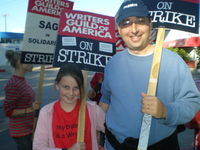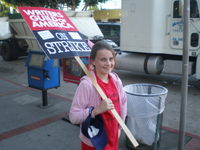
I was back on the picket line a CBS at dawn today, though I moved to the Colfax gate this time. The writers were blowing whistles and encouraging passing cars to lean on their horns (which they did). This irritated the guards who made a show of scowling, counting the number of picketers, and making notations on their clipboards. I’m not sure why they were counting us, but I think we were supposed to be intimidated by it. We weren’t. I also chatted with my friends Bill Freiberger and Rodney Vacarro, which is one of the benefits of picketing. I keep bringing my iPod along but I haven’t listened to it yet.
The Industry
Finding Middle Ground at MIDDLEMAN
The strike has put my friend Javi in a tough situation. He was in the midst of producing his pilot THE MIDDLEMAN, a dream-come-true for him, when the strike was called. Now he is in a moral quandry:
i can’t be legally penalized by the guild for doing my duties as a
producer: but the guild would certainly prefer it if the walkout was
complete – if people like myself struck not only as writers but also as
producers…because if the paralyzing effect of the strike is felt
swiftly and across the board, the producers might be more motivated to
settle quickly.so here i am, given the opportunity to see
through to completion the production of a nine year-old dream into a
pilot…a dream i self-financed as a comic book, seen through to three
volumes and fought to get to this place, into a reality……and
on the other hand, there’s a labor union of which i am a member,
mounting picket lines i am required to honor, running a justified
strike against a predatory media cabal that has no qualms about taking
from creators as much as they can possibly get (while laughably
pleading poverty when their entire raison d’etre is to monetize the
work of people such as myself) asking me to walk away completely.
I wouldn’t want to be in his position. It seems like an awfully cruel twist-of-fate for him.
A Brilliant Video on The Profits Already Being Made in New Media
A YouTube video compiles interviews with Rupert Murdoch, Bob Iger, Sumner Redstone, Les Moonves and others crowing about the huge profits they have already made — and WILL make — from TV shows streamed on the Internet, iTunes, etc. (Thanks to Craig Mazin for the heads-up!)
The Upside of a Walking a Picket Line
Back when the WGA struck in 1988, I was a starry-eyed newcomer in television, fresh off having my first couple of freelance scripts produced. Walking the picket line each day was a chance to meet my TV writer idols and enjoy a master class in TV writing.
Nearly twenty years later, I’m pleased to report that it hasn’t changed.
Today I got to CBS Radford at 5:45 am and walked the picket line with legendary writer/producer William Blinn.
We share two social connections…when he started out in TV, his writing partner was Michael Gleason, my mentor…and he produced the TV series "Our House" with the late Ernie Wallengren, who was one of my closest friends. So I’d heard a lot about Blinn over the years from Micheal and Ernie and, of course, was well aware of his successful career in television.
The congenial Blinn and I spent the whole time talking about TV and, for three hours this morning, I was the happiest writer in Hollywood. He shared anecdotes about his early days writing for "Bonanza," "Maverick," "Gunsmoke," and "Laramie"… about writing the epic miniseries "Roots"…about writing & producing everything from "Starsky & Hutch" to little-known shows like "Lazarus Syndrome" and "Heaven Help Us"… and about working with actors like Wilford Brimley, Broderick Crawford, Michael Landon, Lee Marvin and Lou Gossett Jr. I was almost sorry when our shift ended, though my aching feet where screaming for a rest.
As far as celeb sights go, KING OF QUEENS star Kevin James showed up on the line for about twenty minutes, bought everyone Egg McMuffins and skee-daddled, but we appreciated the support and the vittles.
I had a late breakfast and caught up with the Los Angeles Times, where I was pleasantly surprised to see a very pro-WGA column from Patrick Goldstein, who noted that:
When Tom Freston was fired from Viacom in 2006 he received $60 million
in severance pay, more than all of the DVD residuals paid to WGA
members that year.[…]So why are studios playing such hardball? They say they can’t divvy up
online revenue until they have a better idea of how much money is
generated. Of course, when video came along, the studios persuaded
writers to take a tiny cut of the profits, so as not to kill an
emerging technology. But once they were accumulating windfall profits,
did they ever revisit that deal? Not on your life.
And yesterday, the LA Times profiled a soap opera writer living in Sacramento who stands to lose everything if the strike drags on much longer. Perhaps the print media is beginning to finally see our side of the story.
Lee Rae

Maddie and I arrived at the CBS lot in Studio City at 5:30am for the 6 a.m. picket…and we were the only ones there, if you don’t count the news crew from KABC. The newsbabe asked me if I wanted to be interviewed for her live report and I declined. I figured I could only get myself in trouble.
Other writers started showing up around 6 and picket signs were delivered at about 6:15. We walked for three hours straight, back-and-forth in fr0nt of the CBS studio gates. I chatted with a few folks for a bit, but mostly Maddie and I just walked in circles and talked amongst ourselves. She thought the writers we were way too polite to people coming and going to the studio and that we should have been causing more of a ruckus. There was one actor who joined the picket line — Julie Bowen from BOSTON LEGAL (that’s her in the striped shirt holding the SAG in Solidarity sign behind my daughter) but that was it for celebrity sightings. 
We left around 9:30 and headed straight to Subway for an unhealthy breakfast. I must have walked several miles today. My feet and back are killing me, but I figure that picketing is going to be a great way for me to lose some weight and help my fellow writers at the same time.
I’ll be back on the line tomorrow.
UPDATE: You can see Maddie and I picketing on KABC.
Heading to the Picket Line
My jet lag is paying off. I was up at 4 am, wide awake, so I will be on the picket like at CBS at 6 a.m. with my daughter. I am bringing my Blackberry, so maybe I will post here from the front-lines, so-to-speak.
Struck by the Strike
It has been interesting viewing the strike from across the Atlantic. For the last week, I have been keeping up on things from Munich by reading the International Herald-Tribune, USA Today, and whatever British newspapers I’ve stumbled across. The contrast between how the British press is covering the walk-out and our U.S. news media is, well, striking.
The British press, which has no pretense of objectivity, appears to be solidly behind the writers. More than one article portrayed our demands as reasonable and the AMPTP’s reaction as greedy and bewildering.
But the U.S. press, which does pride itself on objectivity, seems to be siding with the networks and studios. Virtually article mentions how highly paid some screenwriters are, or makes some snide aside about strikers arriving in their BMWs and Mercedes or going from the picket lines to their Malibu beach homes. An article in the Herald Tribune even portrayed striking writers as espresso-sipping dandies wearing "arty sunglasses" and colorful scarves. It’s obvious that more than a few print journalists suffer from an inferiority complex and are jealous of screenwriters.
On top of that, trade publications like Variety and newspapers like the Los Angeles Times depend heavily on studio and network advertising revenue, so it’s hardly a surprise that screenwriters aren’t getting a fair shake. L.A. is an industry town, and it isn’t screenwriters who are keeping the lights on at the Hollywood Reporter.
I did get a kick out of the article in Variety a week or so back, where their editors whined that the WGA refused to be baited by each and every negative comment from the AMPTP. They warned that we were going to be "swift-boated" if we didn’t respond whenever one of their so-called reporters, who don’t know how to write without being spoon-fed a press release, asked for a statement from the Guild. I’m proud that our leaders are, for the most part, taking the high road when it comes to responding to the baiting or in characterizing the state of negotiations.
What has also been interesting to me is the feedback I have been getting from German writers, producers, studio execs and network execs regarding the strike. Much to my surprise, they all seemed to be solidly behind the writers. Why was I surprised? Because writers there don’t have a guild or a union and don’t enjoy the protections, creative writers, standard pay, and other benefits that come from having a strictly-enforced, Minimum Basic Agreement. They also don’t have the financial benefit of residuals (unless they work for the state-owned networks, where they do get some rerun money). I kind of expected them to resent us. But even more surprising to me was the supportive comments I heard from studio execs, most of whom provide shows to the networks on a work-for-hire basis and don’t share in any of the revenues. Considering how immensely popular U.S. shows are in Europe, the execs were shocked that writers are only getting a barely measureable percentage of the windfall profits.
Me, too.
I got home last night. I will be walking the picket line tomorrow.
Why We Are Striking
Here’s a short video that explains very clearly one of the big reasons why the WGA is on strike.
I strongly support the Guild, but I was angry when I learned that we’d pulled the demand to double our DVD residuals off the table. I am hoping that doesn’t mean that the WGA doesn’t intend to seek a meaningful increase of our current rate (which is about 4 cents per DVD).
Why A Strike May Be Necessary
Howard Rodman had an excellent article today in the LA TIMES on the issues the WGA is fighting for…and why we may need to strike to get a fair deal for writers. He says, in part:
First, the companies are still refusing to raise the rate they pay in DVD residuals. […]That decades-old formula is such a thin slice of a thin slice that on each disc, the companies pay more to the manufacturer of the box and packaging (about 50 cents) than they pay in residuals to the writer, director and actors combined (about 20 cents).
[…]Published reports show that the operating income of the entertainment segments of the nation’s media conglomerates has grown at a compound annual rate of 12% between 2000 and 2006, from $8 billion to $18 billion. I guess they just don’t have enough to pay the people who made those revenues possible.
[…]What’s more, the companies refuse to let writers share appropriately in the revenue stream from material distributed over the Internet. They claim that this torrent is at present only a trickle, that there is no "business model," that this all needs to be "studied." And while they search for that elusive business model, they are offering to pay us at those antiquated fraction-of-a-fraction rates. Never mind that, even now, this unstudied trickle is making them millions: Each studio or network has cited $500 million or more a year in online revenue.
Not That Stupid
I am not a master negotiator by any stretch. I get embarrassed when my wife haggles with antique dealers and I break out in a flop sweat whenever I have to buy a new car. But I’m not as stupid as the AMPTP seems to think I am. I wasn’t the least bit surprised by the timing of today’s front-page story in the LA Times about how important residuals are to writers …and the AMPTP’s subsequent announcement hours later that they’ve pulled the plan off the table in the interests of furthering negotiations.
Extending an olive branch to Hollywood’s restless writers, the Alliance of Motion Picture and Television Producers today said it would withdraw a controversial and deeply unpopular proposal on residual payments that had threatened to derail talks on a new contract when the current one expires Oct. 31.
The action does not mean the two sides are much closer to a deal, but it does remove what had been a major stumbling block in negotiations.
"In the overriding interest of keeping the industry working and removing what has become an emotional impediment and excuse by the WGA not to bargain, the AMPTP withdrew its recoupment proposal," Nick Counter, the industry’s chief negotiator, told guild leaders this morning.
Aren’t they sweet? Aren’t they caring? Aren’t they so reasonable? All the networks and studios want in return now is for the radicals at the WGA to pull their insane demand for a larger cut of DVD and new media revenues off the table.
Is there anybody who believes for one second that the demand for a complete revamp of the residual system was anything but a negotiating ploy? It was obviously a PR stunt to manipulate the media and play on the fears of the weakest-willed of the WGA membership.
The media may be gobbling it up ("Extending an olive branch to Hollywood’s restless writers.." !?), and also a lot of anxious below-the-line crew members who will be terribly hurt by a strike, but I’m not that stupid and I hope the majority of my fellow WGA members aren’t, either.
The AMPTP’s ploy reminds me of a trick that an old mentor of mine used to pull on the network. He would always add a scene to a script that knew the network would object to. And when they did object, he would fight for the scene as if it was the most important thing in the script to him. But later, when they were arguing over another point in the script, one that really did mean something to him, he would give in on the other, hotly disputed scene. It would appear to the network that he’d given up something very important to him, that he’d made a real sacrifice, and they would relent on the other scene…which, in fact, was the only scene he really cared about. He called those fake scenes his negotiating chips…and the network never caught on to his act.
I hope the WGA negotiating committee has caught on to the AMPTP’s…and that they stick to our reasonable demands and don’t fall for this obvious and insulting ploy. I see the fight over DVD and new media revenue as nothing less than a fight for the future of our Guild…a fight as necessary as the battles fought to get us residuals in the first place.
Are these issues that I believe are worth striking over? Hell yes.
Do I want a strike? No, but so often in the past when we have caved in to the AMPTP’s pleas to cut them a break on "new media" (like video cassettes and basic cable once were) by granting them a "temporary" residual system that gives us pathetically small percentage of the revenue, we have been rewarded by being stuck with that "temporary" system for good. We have been weak, and we have been played for fools, too many times before.
It’s time now to take a stand.

